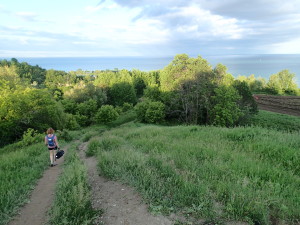Next time you visit your favorite park, notice how many people are trying to hike a trail (and not fall on their faces) while texting. Next time you travel to a beautiful vista point, notice how many people are frantically snapping iPhone pictures of the view rather than actually looking at it. Next time you’re camping, notice how many tents are illuminated by iPads playing Netflix episodes off the campground’s Wi-Fi. Technology has its place in the world, but that place is most certainly not in the outdoors.
I recently read an interesting article about a bunch of neuroscientists who were sent out to spend a week in southern Utah rafting the San Juan River, hiking tributary canyons, and camping along the way. Sounds like a rough gig, right? The whole point of this adventure was to investigate whether remote natural retreats can actually reverse the harmful effects of heavy technology use in the human body. The scientists had no cell reception, no outlets to plug in their laptops, and no distractions from the pure beauty overwhelming them from every direction.
Overuse of technology is so widely accepted these days that we look at people who don’t have smartphones like freaks of nature, instead of lovers of nature. We have become a culture of obsessive email checkers and arbitrary Facebook posters with a frantic need to be entertained every moment of the day. Unplugging is obviously more challenging for some people than others. If you’re a self-diagnosed technology junkie, your best bet it to travel off the grid so that nature makes the decision for you. Before you unplug, look up your voice and data provider’s coverage map and choose trip destinations as far away from the coverage as possible to avoid temptation.
Next time you stare into a roaring campfire, direct your mind away from the day’s events and turn it into a blank slate. Next time you sit on the pier and watch waves crash into the shore, relate the water’s fluidity to your own transient state from one life phase to the next. We adults are setting a really crappy example for the young whipper-snappers, who don’t even understand a life that doesn’t revolve around a LCD screen. It’s now or never, people.
 So what did those guys in Utah conclude from their little adventure? Well for one, they confirmed that the drumbeat of data creates a false sense of urgency that affects our ability to focus. They also confirmed that the data takes up valuable brain memory that could be put to better use with creative endeavors that inspire original thought, rather than a regurgitated version of what someone else already came up with. So next time you go outdoors, leave your devices at home, take a breath of fresh air, and force yourself to look outside above and beyond yourself. Your mind, body, and soul will thank you, and it doesn’t take a neuroscientist to figure that out.
So what did those guys in Utah conclude from their little adventure? Well for one, they confirmed that the drumbeat of data creates a false sense of urgency that affects our ability to focus. They also confirmed that the data takes up valuable brain memory that could be put to better use with creative endeavors that inspire original thought, rather than a regurgitated version of what someone else already came up with. So next time you go outdoors, leave your devices at home, take a breath of fresh air, and force yourself to look outside above and beyond yourself. Your mind, body, and soul will thank you, and it doesn’t take a neuroscientist to figure that out.

